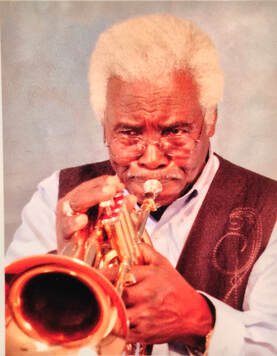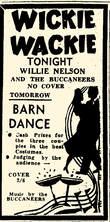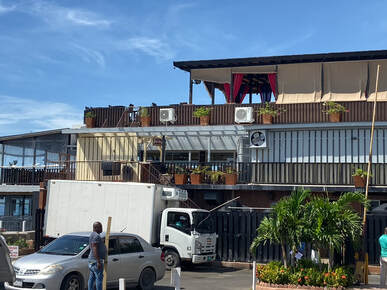 Frank Anderson (Photo courtesy of Frank Anderson). Frank Anderson (Photo courtesy of Frank Anderson). (Rich Lowe, www.reggaejamaicaway.com, 2022) The “Crop Over” is often recognized as the historical post-cane harvest celebration in Barbados that is now government-sponsored. The term means the sugar cane crop work is over; the harvest is complete, and it is the time to celebrate, especially if the crop is bountiful. Crop Over is a Barbados summer festival featuring market sales, food, drink, live music, and dancing. Crop Overs were also celebrated in Jamaica and date back to the 1700s (Cassidy p. 90). Trumpet player Frank Anderson worked with many great orchestras: Milton McPherson and his Orchestra, Val Bennett’s Orchestra, and George Moxey and his Band. He also worked with The Eric Deans Orchestra on lead trumpet beginning in 1949 and maintained his connection until Deans left for England. With Byron Lee And The Dragonaires, he played live with the band and recorded on the Byron Lee albums Sparrow Dragon Again and Many Moods Of Lee. Anderson recorded with the players who went on to form The Skatalites on tracks like “Exodus,” “Feeling Fine,” “St. Lucia,” “Wheel & Turn,” “Ska Ba Doo,” “Peanut Vendor,” “Occupation,” “Always On Sunday,” “Musical Storeroom,” and “King Solomon.” Anderson formed and traveled extensively with his group, Frank Anderson & The Super Stars, in the US. Frank Anderson is as strong as ever. He has a great list of stories that he frequently tells. Wherever he may be, strangers tend to gather around him as he reaches back into his memory for one of his stories. His list is continually growing and includes flying over Haiti with The Eric Deans Orchestra in a military plane riddled with bullet holes, carrying a gun in his twenties to make a statement, discovering where a fellow bandmember hid all of his performance money, returning visits from a ghostly woman when he was auditioning for Eric Deans, surviving a car crash at Stony Hill, his time with Nat King Cole, and the story that follows about a Crop Over Dance: A Crop Over Dance, as told by Frank Anderson, Trumpet player The crop over is the Jamaican farm workers and farmers; they work all week on the farms, and on Saturday night, they all would come to town for a dance. Eric Deans was smart, he would keep the performance early and play, and the people coming from the country to the dance would pass by. That’s what made him so good, he was one of those; hoity-toity think himself better. He would play for the country people coming by, and the truck would stop, and they come in and sit down and buy a white rum and coke, and white rum and water. Some get drunk, and the band would play. Country music was different from the city music. City are used to big band [like] Count Basie, Duke Ellington, and Harry James. In the country, they like quadrille, like calypso [Anderson sounds out melodies]. The kind of calypso thing where you hold her close with gyrations. Like sexual intercourse. We would also travel up to the country parishes where the workers were living. It’s the strangest thing, their language is quite different [in the country]. I have to ask: “What did he say?” You come from Kingston; you are a city boy. I was only nineteen or twenty. Not that they are dumb in the country, they just speak different. We try to keep it Saturday, so we could come back to Kingston and play our Saturday gig because you could lose money. Don’t expect a lot of money neither because they don’t got money. The music is the entertainment, and when you come from Kingston, they treat you like a king! It was love. This is the early 1950s, and back in those days, we drive into the country until we can’t drive no more, and then we get out at Sligoville. When we reach, we would have to go in a cart that a mule would pull. We would play some music and ride through the countryside, and people would hear and say: “The band is here! They gonna play at Center” Now, Center is not a big hall, is a big clearing. When it start, it has grass on it, like a golf area. These people would build a house in one minute. They would chop down bamboo and put up a shed with flooring [build a stage]. The band would go up there and play. This is a true thing. After a while, a guy named Val Bennett, who plays saxophone, came up there and brought his Kingston band, and he’s going to play his Broadway music, and [speaks slowly] they’re gonna like it whether they like it or not. Now, there’s this guy, he’s very intimidating. He’s barefoot, and he has a machete strapped to his side-they all do. Not that they would chop up anybody, but they are farmers. On Sunday, they put on their Sunday best to dress up like they are going to church. For you, they dress up, but not really much. Val Bennett goes out there and plays American music, and they stand out there, and they listen, and it was good. I’ll never forget it; Val play until somebody came up and say: “Listen, we don’t like that kind of music. We have had enough of it. We want you to play our kind of music.” It’s mento [music] they want. Mento is a mix of calypso and African. You have the drum beat [sounds out the drumming]. Any kind of melody that you could come up with, you better come up with it fast. You don’t stop. Mento; it varies from slow, to medium, to fast. The drummer works, and the trumpeters work. Val keeps us playing Broadway. The bad man in town with the machete, a black goliath, tall-looking down on everyone, come back up and say: “I told you we don’t like that kind of music. We want you to play mento!” Val Bennett says: “I’m the band leader, man!” We tell Val to please listen to these people. He says don’t listen to them. We were little boys anyway. Y’know, the man came with the sharpest machete I’ve ever seen. He put it at Val’s neck and said: “No! Come with me, Val.” He took Val’s saxophone, and he reached up and tied it with a string to the roof of the shed they built, and it was twirling around. This is a true story; you can ask Mickey O’Brien about it. He was there! This man said: “Listen, Val, if you think you are Jamaican bad, touch that [extends the word] saxophooone!” We carried a big band down there, so the man say: “Now! You, you, and you. You play!” Ernest with his little guitar, the drummer play, the saxophone play, and me and Mickey play till our lips was raw. We couldn’t stop. We play the calypso song “Soldering,” and that was the longest calypso you ever hear in your life. They have the big fire, and the curry goat is being cooked ‘round the clock, and the whole town is there. The music play till the drummer fall out, and then Mickey start playing the drums. You don’t stop because the guy has this machete. They took Val Bennett and say: “Now, Val Bennet! You gonna go down to the river, and you gonna be carrying water to the kitchen.” They gave Val Bennett a great big bucket, and two guys march him down by the river. He has to go fill that bucket and come up with water and supply the kitchen while they cooking the curry goat, rice, yam, and banana [laughs]. His shirt got wet up, and they have him take off his shoes, but he was not used to that, man! They tell Val that he can take a break and take a rest, and his saxophone just keep twirling around and around and around! It was most embarrassing to him, and it was humorous to us. It was very serious, we didn’t want nobody doing anybody [didn’t want anyone to get hurt]. The band was saying [speaks in a hushed voice]: “They will chop him, chop him up.” We don’t bother try nothing because, by the time the police reach, he will be done. That man bring law and order to that town. You don’t go there and commit a crime, or you are not coming out alive. (Frank Anderson, Musician-trumpet, Interview by Author, 17 April 2021). Reference Cassidy, Frederic G. 2007. Jamaica Talk - Three Hundred Years of The English Language In Jamaica: Kingston, Jamaica: University of The West Indies Press.
0 Comments
|
Archives
March 2024
|



